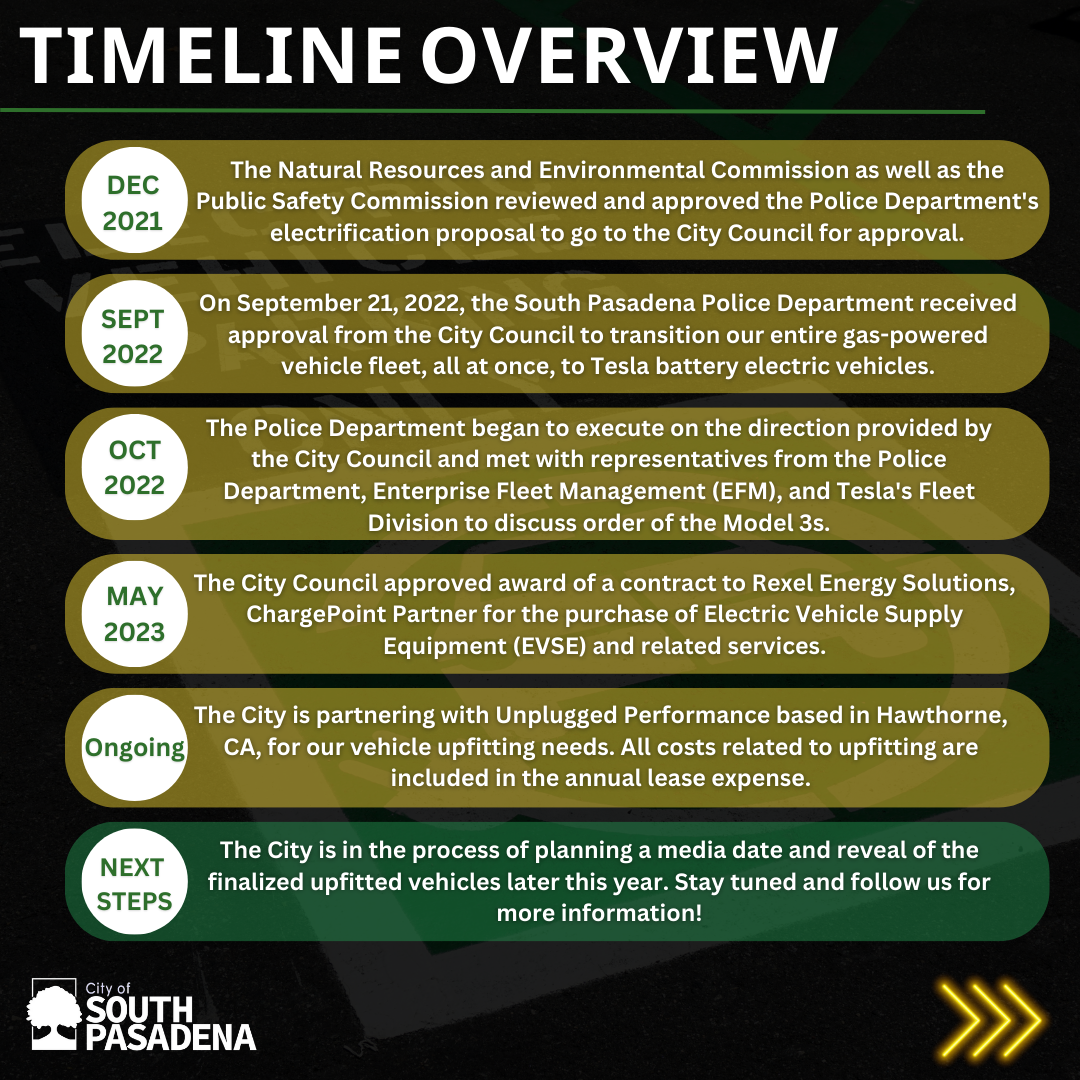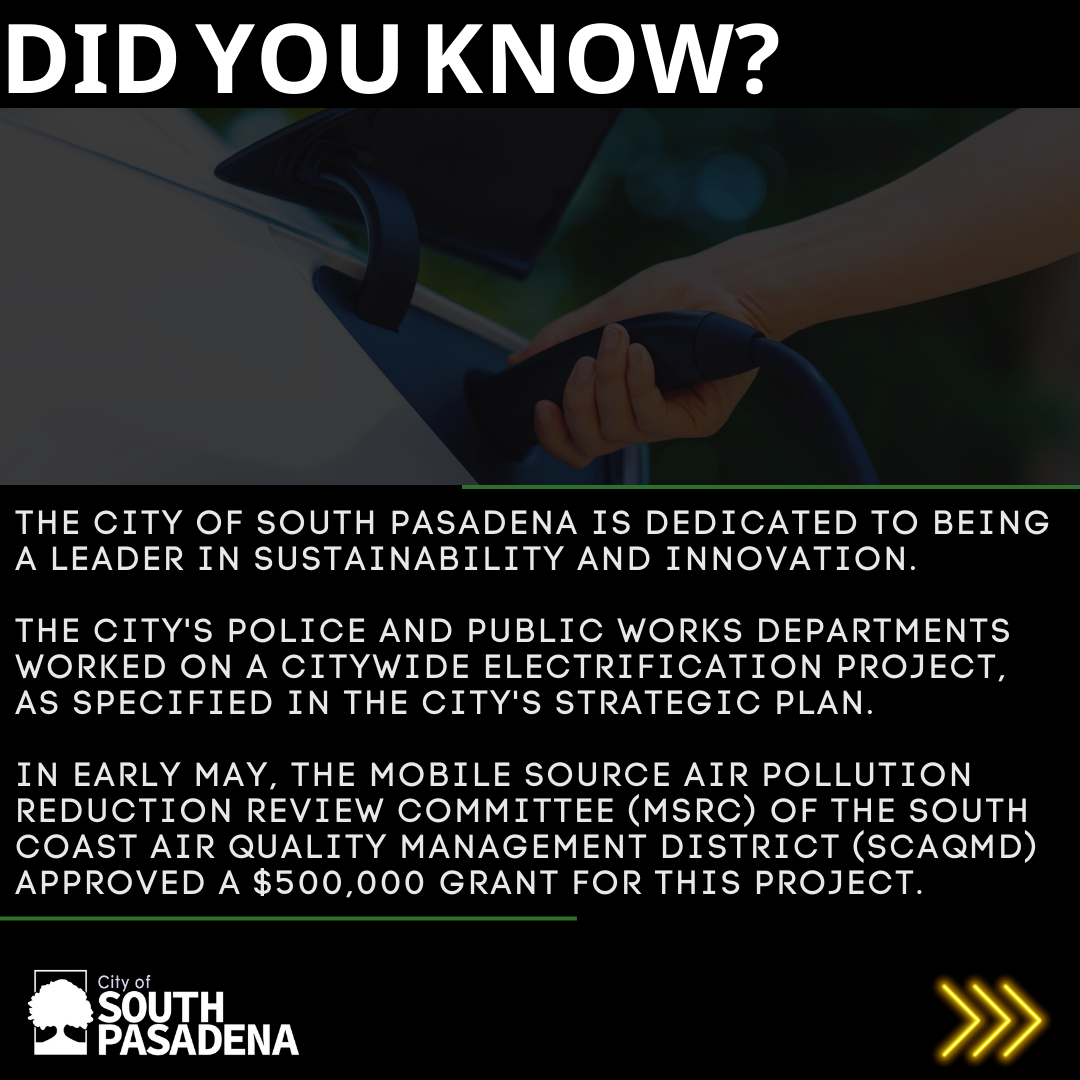Police Department Electric Fleet Conversion

Background
On September 21st, 2022, the South Pasadena Police Department received approval from the South Pasadena City Council to transition our entire gas-powered vehicle fleet, all at once, to Tesla battery electric vehicles (BEVs). In addition, the City Council also approved two charging infrastructure projects to support our transition to BEVs. Over the course of the next year, charging infrastructure will be installed and the SPPD will acquire ten Tesla Model Ys for patrol operations and ten Tesla Model 3s for Detective/administrative use through a vehicle-leasing program.
The transition approval was the culmination of over three years of research and due diligence, which included closely tracking the progress of over thirty-five other law enforcement agencies across the United States who have integrated one or more Tesla BEVs into their fleet. Our approval would not have been possible without these early adopters sharing their documentation and willingness to share their experiences. Thank you!
This page is intended to serve as a resource for law enforcement agencies seeking information to justify their proposals and hopefully inspire others to accelerate their transition to BEVs. Our EV Project Lead, Sergeant Tony Abdalla, can be reached at tabdalla@southpasadenaca.gov to assist with any questions.
Why Transition to Battery Electric Vehicles?
Simply put, the Tesla Model Y we identified as meeting and/or exceeding our needs for patrol operations is safer, out-performs, and costs significant less to power/fuel & maintain than the gas-powered vehicles we use now. When you add the climate and health benefits of eliminating greenhouse gas (GHG) emissions on top of the economic and performance benefits, the decision to transition became a no-brainer.
Over a ten-year period, we are projecting a cost savings of just over $312,000.
| Factors |
2022 Tesla Model Y
(Electric) |
Ford PPV
(Gas) |
| Vehicle Cost |
$68,890 |
$44,850 |
Range
(EPA estimate based on Original Equipment Manufacturer) |
330 miles
(74 kilowatt-hour [kWh] battery) |
344 miles
(18.6 gallon tank capacity) |
Cost of Energy/Fuel
(Full Capacity) |
$7.40
($0.10 kWh average) |
$99.88
($5.37 per gallon) |
Annual Cost of Energy/Fuel
(15,000 mi/year) |
$336 |
$4,355 |
Annual Cost of Maintenance/Repair
(Estimated) |
$846 |
$1,653 |
Cost per Mile
(Estimated) |
$0.10 |
$0.40 |
Read the staff report providing the background on this project(PDF, 27MB), and locate items 16 and 17.
Charging Infrastructure and Redundancy
In order to successfully transition our entire fleet to BEVs, a charging infrastructure of sufficient scope and scale to support it is critical. In partnership with Southern California Edison’s (SCE) Charge Ready program, thirty-four Level 2 chargers will be installed in the Police Department, Fire Department, and public employee parking lots. Fourteen of the chargers will be made available for public use. One additional Level 3 DC, dual-port, fast-charger will be installed in the Police Department parking lot.
Additionally and in partnership with the Clean Power Alliance (CPA) Power Ready program, solar panels and battery storage will be installed in a city-owned, public parking lot directly across the street from the City Hall Complex. The CPA Power Ready Program system will support critical electrical usage with emergency backup power in the event of a power grid disruption.
Vehicle Leasing
Vehicle leasing was the only viable, cost-effective option to acquire the number of vehicles we needed to replace our entire fleet, all at once. In addition, the sixty-month open-ended equity lease gives us some additional flexibility. Our options at the end of lease term are 1) acquire the fleet for the residual balance, 2) extend the lease for another estimated 6-7 months to pay the residual amount down to a zero balance, or 3) use the equity in the fleet at the end of lease term to enter into a new lease.
We chose Enterprise Fleet Management (EFM) as our vehicle-leasing partner through the Sourcewell cooperative purchasing program. Cooperative purchasing is “Procurement conducted by, or on behalf of, one or more Public Procurement Units” as defined by the American Bar Association Model Procurement Code for State and Local Governments. Sourcewell's analysts streamline the procurement process for participating agencies by developing RFPs and IFBs for national, competitive solicitations that meet or exceed local requirements.
Upfitting
We are extremely fortunate to partner with Unplugged Performance based in Hawthorne, CA, for our upfitting needs. Unplugged Performance are the global experts when it comes to customizing and upfitting Tesla vehicles. All costs related to upfitting are included in our annual lease expense.

